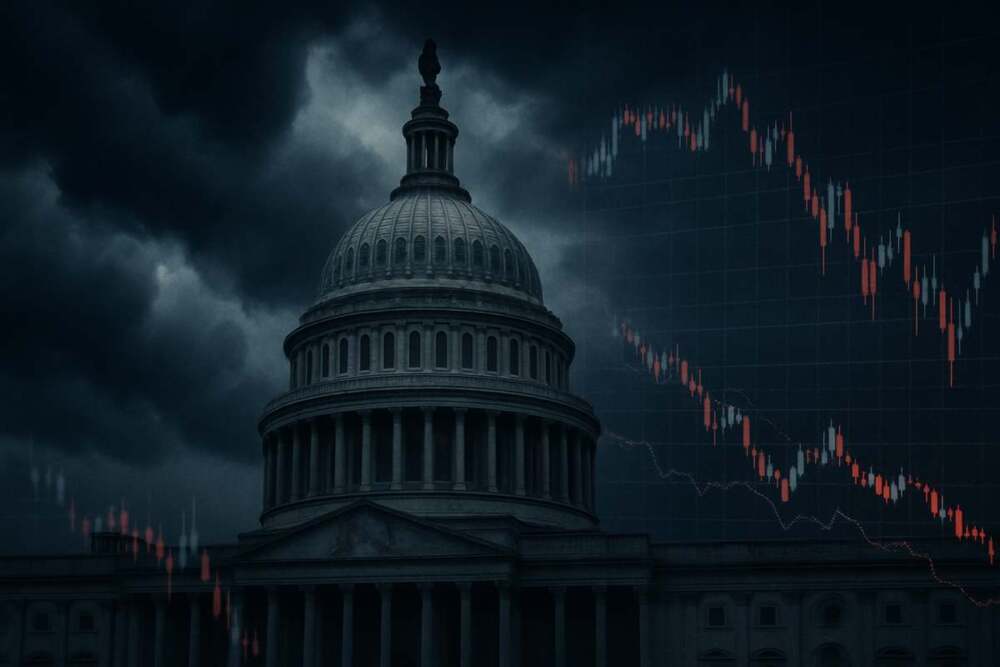October 6, 2025 — Global financial markets opened the week in a tense but cautiously optimistic mood, as investors weighed the disruptive effects of the ongoing U.S. government shutdown against a powerful rally in technology and artificial intelligence sectors. The day brought a mix of contrasting forces — fiscal deadlock in Washington, political upheaval in Europe, and fresh stimulus hopes in Asia — leaving traders balancing fear with opportunity.
Wall Street Balances Caution and Confidence
In the United States, major stock indexes held steady near record levels as the resilience of big tech continued to buoy investor confidence. The S&P 500 and Nasdaq Composite edged higher, while the Dow Jones Industrial Average traded slightly lower amid profit-taking in cyclical sectors.
Tech giants once again dominated trading activity. Shares of AMD surged after announcing a landmark deal with OpenAI, which analysts said could solidify its position in the AI chip race and challenge industry leader NVIDIA. The news sparked renewed enthusiasm across the semiconductor industry, triggering gains in chipmakers, cloud providers, and AI software developers.
Yet beneath the optimism, caution persisted. The continuing federal shutdown — now stretching into its second week — has frozen multiple government services, delayed data releases, and increased fears of an eventual drag on consumer sentiment. Key economic indicators such as jobs reports and retail sales figures remain suspended, leaving markets flying blind.
“It’s a strange combination of bullish tech momentum and macroeconomic fog,” said one New York-based market strategist. “Investors are betting on innovation but ignoring the very real risk of fiscal paralysis.”
Government Shutdown Clouds Economic Visibility
The standoff in Washington has intensified debate about fiscal discipline and political dysfunction. With agencies closed and data pipelines frozen, economists warn that the lack of transparency could distort near-term monetary policy expectations.
The Federal Reserve faces an additional challenge: without official data, it must rely more heavily on private indicators and anecdotal evidence to gauge inflation and labor market conditions. Some analysts believe this could delay or distort rate decisions, creating more volatility in bond and equity markets.
Treasury yields fluctuated as investors sought clarity on the shutdown’s economic cost. Short-term yields rose slightly amid uncertainty over government payments, while longer-term bonds saw increased demand as traders hedged against market instability.
Europe Faces Turmoil as France’s Political Crisis Deepens
Across the Atlantic, European markets were rattled by the resignation of France’s Prime Minister, an unexpected move that sparked a sell-off in French equities and bonds. The euro weakened as investors assessed the potential fallout for fiscal stability and EU unity.
Market observers noted parallels to previous European crises, as uncertainty over leadership and budget discipline rekindled fears of investor flight. “France is too big to fail in Europe’s financial system,” one analyst remarked. “When Paris sneezes, the eurozone catches a cold.”
Despite the turmoil in France, Germany’s DAX index managed a modest rebound, buoyed by stronger-than-expected industrial orders. The FTSE 100 in London remained flat as energy stocks offset losses in financials.
Asia Rallies on Japanese Political Upset and Stimulus Hopes
In contrast to Europe’s jitters, Asian markets found strength in political change. Japan’s equities soared to fresh highs following the leadership victory of Sanae Takaichi, who has signaled support for continued fiscal stimulus and pro-growth spending.
The Nikkei 225 hit a new record, while the yen slumped to multi-year lows — a sign investors expect looser fiscal policy and sustained central bank accommodation. Analysts said this combination of political stability and monetary flexibility is fueling optimism about Japan’s economic recovery.
Elsewhere in Asia, China’s markets were mixed as Beijing continued to face pressure from sluggish consumer demand and ongoing property market risks. However, investors noted that recent signals from the People’s Bank of China suggest additional liquidity measures may be in the pipeline.
Tech Sector Remains the Market’s Power Engine
Even amid macroeconomic uncertainty, technology remains the dominant force driving global equities. The AMD–OpenAI announcement reignited enthusiasm around AI infrastructure, reminding investors that digital transformation is still the most potent growth story in global markets.
Major cloud and semiconductor firms continued to rally, while investors poured capital into next-generation computing, robotics, and data security stocks. The Philadelphia Semiconductor Index posted its largest weekly gain in over a month.
Still, analysts warn that valuations are running hot. “The AI boom is very real, but parts of the market are starting to price in perfection,” said one fund manager. “Any disappointment in earnings or guidance could trigger a sharp correction.”
Commodities, Crypto, and Currency Moves
Oil prices dipped slightly as traders weighed slower demand growth against supply constraints from ongoing Middle East tensions. Brent crude hovered around $87 a barrel, while U.S. West Texas Intermediate remained near $84.
Gold prices stayed elevated near record highs, supported by risk aversion and currency volatility. The weakening yen and euro also contributed to a stronger dollar index, which hit its highest level in nearly a year.
Cryptocurrency markets were mostly stable, with Bitcoin trading around $63,000 and Ethereum near $2,500. Traders said digital assets benefited from the perception that traditional markets were entering a “data blackout” due to the U.S. shutdown.
Market Outlook: Between Momentum and Uncertainty
The week ahead promises continued volatility as investors navigate a data vacuum, fiscal standoffs, and evolving global political landscapes. Traders will watch for updates from Washington on negotiations to reopen the government, while corporate earnings guidance may provide clues to real economic momentum.
In Asia, attention will remain on Japan’s new policy direction, while in Europe, France’s next political steps could determine whether the euro stabilizes or slips further.
Despite the swirl of risks, the underlying narrative remains one of cautious optimism. The AI revolution, corporate resilience, and global liquidity continue to underpin market confidence. Yet the fragility of fiscal systems and the unpredictability of politics keep investors on alert.
As one veteran portfolio manager summed it up:
“This is the most paradoxical market in years — exuberant about technology, but haunted by everything else.”
















Leave a Reply